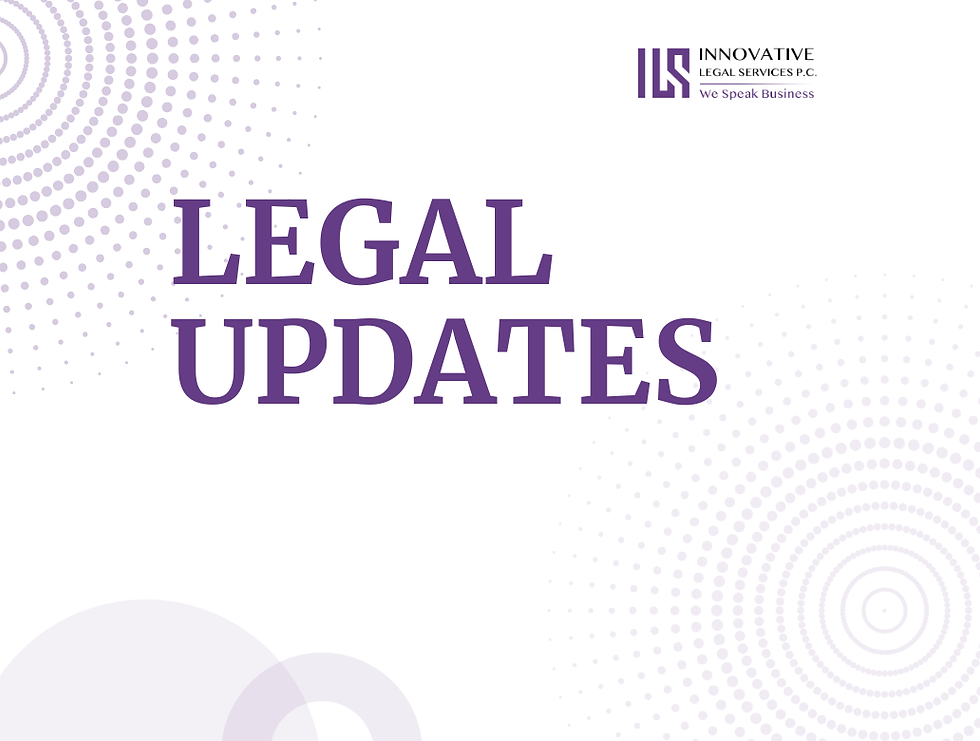California Supreme Court Ruling: Single Racial Slur by Coworker Can Expose Employers to Liability
- Richard Liu
- Aug 7, 2024
- 3 min read
In a pivotal ruling, the California Supreme Court in Bailey v. San Francisco District Attorney’s Office examined critical issues related to workplace harassment and retaliation under the Fair Employment and Housing Act (FEHA). This decision highlights the importance of preventing and addressing even isolated incidents of racial harassment and provides clarity on what constitutes an adverse employment action in retaliation claims. Employers should take note of this ruling to ensure their policies and practices are in compliance with legal standards and to foster a safe, respectful work environment.
For additional information regarding California’s employment laws, and to find out how this could impact your business, please contact our Managing Partner, Richard Liu, at richard.liu@consultils.com.

Case Background
Twanda Bailey, an African-American employee with fourteen years of service at the San Francisco District Attorney’s Office, reported that a coworker called her the N-word. Ms. Bailey reported the incident to other coworkers but initially hesitated to file a formal complaint with Human Resources (HR) due to fear of retaliation. When she eventually attempted to report the incident to HR, she faced obstruction and intimidation from the HR manager, who threatened her and hindered the formal complaint process. The employee alleged this conduct amounted to retaliation.
Lower Courts' Rulings
The trial court granted summary judgment for the employer, concluding that the single use of a racial slur by a coworker was not severe or pervasive enough to support a harassment claim. Additionally, the court determined that the HR manager’s actions did not constitute retaliation. The California Court of Appeal affirmed the trial court’s decision, emphasizing the distinction between racial slurs uttered by supervisors and those by coworkers.
Supreme Court’s Analysis
The California Supreme Court reversed the lower courts' rulings, providing a detailed analysis that reshapes the understanding of what constitutes severe or pervasive conduct in harassment claims. The Court emphasized the following points:
Context Matters: The severity of a racial slur must be evaluated in the context of the workplace and the relationship between the parties involved. Even a single racial slur can create a hostile work environment if it is understood from the perspective of the targeted individual.
Totality of Circumstances: The Court highlighted the importance of considering all relevant circumstances, including the nature of workplace interactions and the informal power dynamics at play. A coworker’s relationship with supervisors or HR can imbue them with a degree of authority that impacts the victim’s work environment.
Employer Liability: Employers are liable for coworker harassment if they knew or should have known about the conduct and failed to take immediate and appropriate corrective action. The Court noted that the HR manager’s response—or lack thereof—can convey a message that harassment complaints will not be taken seriously, undermining the remedial efforts of others.
Implications for Employers
The Bailey decision has several key takeaways for employers:
Single Racial Slur Liability: Even a single racial slur by a coworker can lead to employer liability if it creates a hostile work environment when viewed in the context of the totality of circumstances.
Anti-Harassment Policies: Employers must ensure that their anti-harassment policies are robust, clearly defined, and provide multiple avenues for employees to report inappropriate conduct.
Training and Awareness: Managers and HR personnel must be trained to recognize and address harassment and retaliation promptly. They should be aware of the informal power dynamics that can exist in the workplace.
Retaliation Claims: Retaliation need not be tied to a specific adverse employment action. A series of subtle, yet damaging actions over time can collectively constitute retaliation.
Conclusion
The California Supreme Court’s decision in Bailey v. San Francisco District Attorney’s Office sets a precedent that heightens the responsibilities of employers in addressing workplace harassment and retaliation. Employers must take a proactive approach in creating a respectful and inclusive workplace, ensuring that all complaints are taken seriously and addressed promptly to avoid liability.
For additional information regarding California’s employment laws, and to find out how this could impact your business, please contact our Managing Partner, Richard Liu, at richard.liu@consultils.com.

Richard Liu, Esq. is the Managing Counsel of ILS. He serves clients as a management-side defense lawyer specializing in employment and business litigation. Richard is also an expert on litigation prevention and compliance. He regularly advises Fortune 500 companies and startups on employment, labor, and commercial matters.
Email: richard.liu@consultils.com | Phone: 626-344-8949
*Disclaimer: This article does not constitute legal opinion and does not create any attorney-client relationship.

Comments